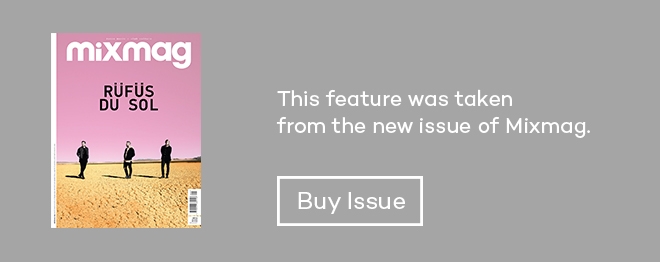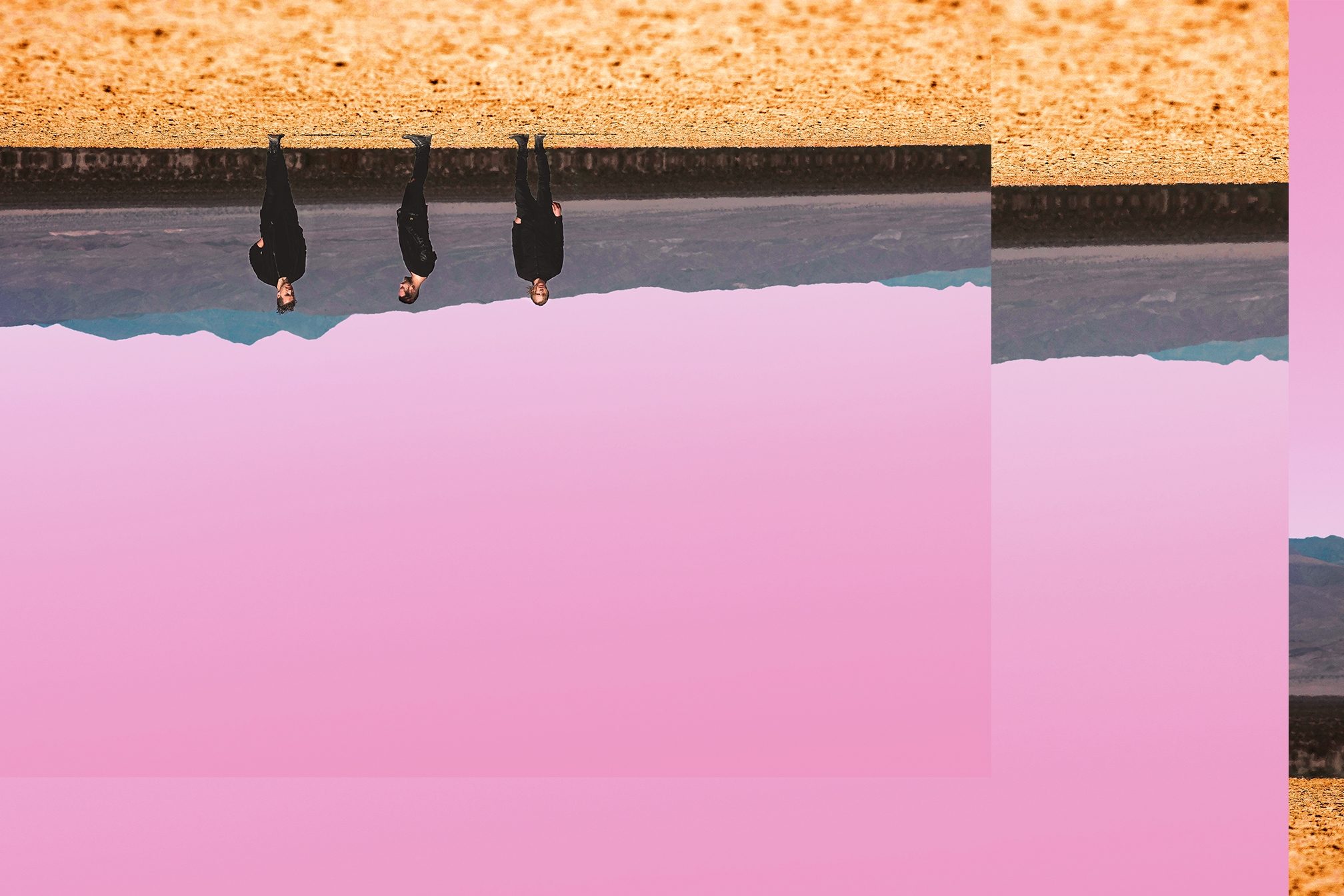 Cover stars
Cover stars
RÜFÜS DU SOL are fast becoming one of the world's most popular live electronic acts
With new album ‘Solace’, Rüfüs Du Sol transcend club tours in favour of concert halls
Los Angeles-based Australian three-piece Rüfüs Du Sol are steadily becoming one of the world’s most popular live electronic acts, thanks to the heady euphoria of tracks like ‘Sundream’ and ‘You Were Right’. Their third album ‘Solace’ looks like it will be the tipping point for a band Pete Tong says “are about to hit a whole new level”
A few blocks away from the beach in Venice, California, the air feels crisp, sharp with an invisible shroud of ocean salt, just cool enough for a sunbeam upon bare shoulders to be warmly welcomed. Two houses down from a sleepy intersection sits a property dubbed ‘Rose Avenue’ by three-piece band Rüfüs Du Sol, who’ve called this place their own for the past year. Today, the house is alive with people who’ve gathered for a bittersweet celebration: it’s one part a birthday party for keyboardist Jon George, but also a farewell gathering to the house. The crew is set to move out in two days’ time.
It’s time for the band to get moving again, and only the titanic itinerary in store surrounding their upcoming album could’ve convinced them to cut ties with the cosy nest they’ve created here. A sprawling North American tour lies ahead, including three nights in a row at not one, but two iconic venues: New York’s Terminal 5 and The Shrine in Los Angeles. Both shows sold out in a matter of minutes. It’s the next evolutionary stage for the group who’ve continuously toured since the release of their last album two years ago, gracing the likes of Coachella, Bonnaroo, Electric Forest, EXIT, CRSSD, Las Vegas’ Electric Daisy Carnival, Splendour In The Grass and more.
Tickets to their tours are already in high demand despite the fact that their third studio album ‘Solace’ has yet to reach the ears of the masses. They’ve got a good track record: both their previous albums ‘Atlas’ and ‘Bloom’ reached stratospheric heights, with both going to No 1 in their native Australia and recent single ‘No Place’ topping the iTunes Electronic chart and Hype Machine chart on release. The band has also amassed an impressive 400,000,000 streams across listening platforms.
Their home country of Australia has a track record in ‘electronic bands’ too, and like Cut Copy, The Presets, and Empire Of The Sun before them, Rüfüs comfortably straddle the two worlds of live and electronic music. They’re among the few acts to have played Coachella twice in a row, as a live act on the Gobi stage in 2016, and then doing a DJ set in 2017. Rüfüs Du Sol’s ability to capture audiences and make them dance, whether wielding instruments or a pair of CDJs, certainly doesn’t go unappreciated.
“They are still a rarity,” says Pete Tong, who regularly spins the group’s singles to high praise on BBC Radio 1. “There are thousands of DJs, but not many [like] Rüfüs. The music business became much harder for bands that bridged dance and electronic music after 2000. If a band didn’t have a hit on the first album, they were usually dropped by the label, but Rüfüs found another way in the modern era.”
Working with independent labels Sweat It Out and ODESZA’s Foreign Family, Rüfüs built a sturdy and loyal following with audiences that appreciated their role on a spectrum that bled across genres. Only now – some 250,000 tickets sold and several hundred worldwide shows later – have they finally paired up with a major label. “They’ve had time to hone their craft in the shadow,” Tong adds. “They’re about to take their music and awareness to a whole new level.”
The group found their footing and emerged onto the scene while acts like Disclosure and Gorgon City were quickly establishing vocal house as a trend for kids still dewy-eyed for electronic music, laying the groundwork and building a fanbase for a slow-burning and prolific career and avoiding the curse of fizzling out early as a one-hit wonder. Their debut album was created beachside of their home town, Sydney, and captured their initial audience with the immersive and melodic sound heard on aptly titled songs like ‘Sundream’ and ‘Desert Night’. After that, the band packed up and moved out to Berlin to explore their shared love of darker, electronic influences on a less sunny evolution of the Rüfüs discography for ‘Bloom’. Pick any performance in any city: their fans will sing back every word verbatim to not one, two, or even three singles, but at least six of their most well-known songs – if not the entire set-list. “I wouldn’t have played their records in the first place if I didn’t think they were special,” says Jason Bentley, music director of LA’s KCRW radio station. “I don’t think they’ve released their best record yet, but that seems imminent.”
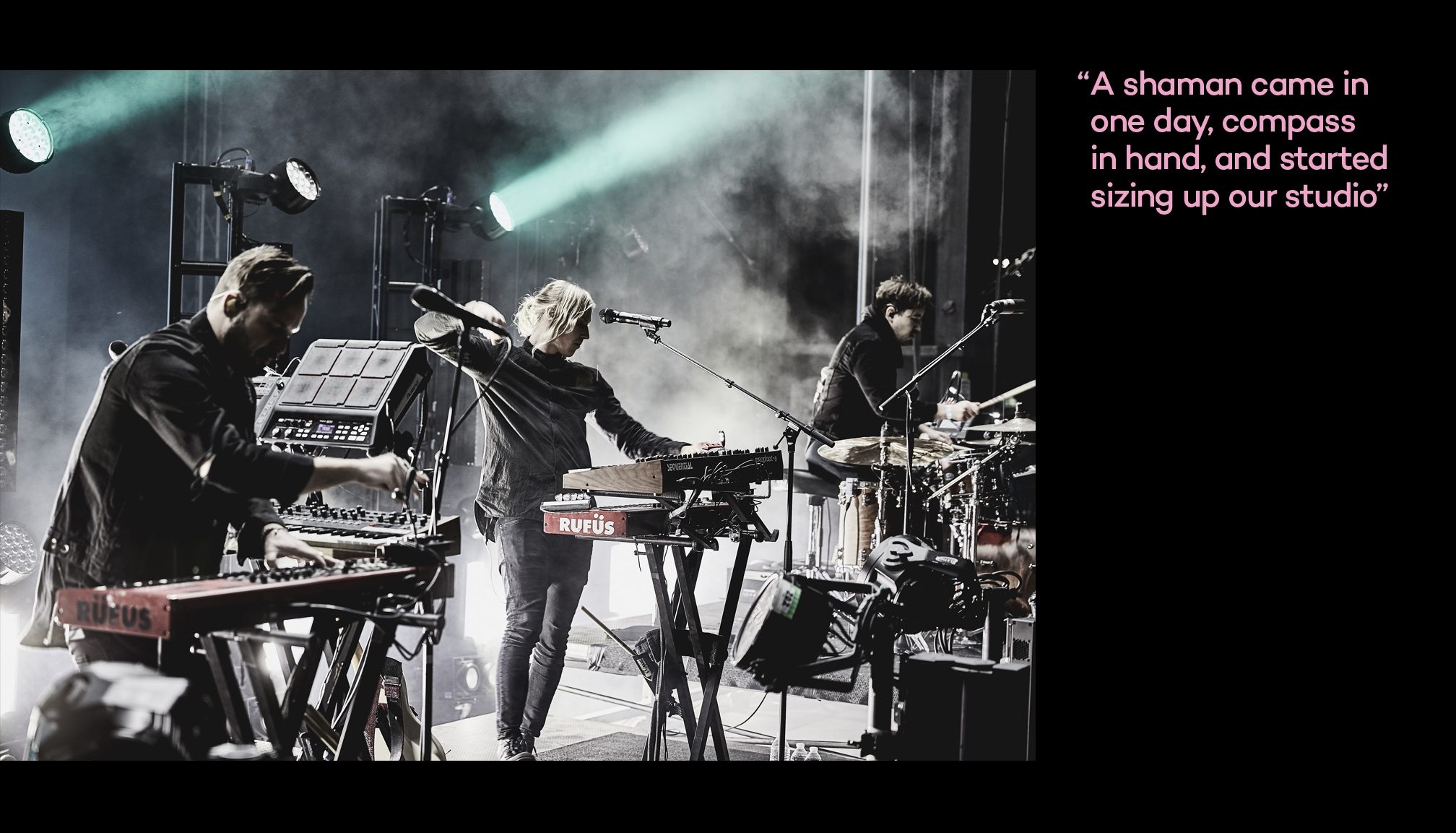
There are three members of Rüfüs Du Sol. Broad-shouldered, always smiling keyboard player Jon George (a tattoo of piano keys signals his role in the band) is today adorned with a smear of glitter to match the twinkle in his eyes, and wears thick rings that catch the light as he moves his hands in tandem with his words. Singer and guitarist Tyrone Lindqvist is an accidental, effortless walking Australian surfer stereotype with long blonde hair in a messy ponytail and vivid blue eyes that often seem far away in a daydream. James Hunt has a permanent, playful smile and is quick with the softly spoken but sharp-witted one-liners, the way he leans into a conversation mimicking the way he hovers powerfully over a drum kit on stage.
In the back yard of Rose Avenue sits a pool house that’s undergone a curious transformation into a home studio. The band’s instruments, synths and other kit sit in the room like warriors at the ready, but the true star of the space is the bizarre décor on the walls, and, in some places, the floor and ceiling. In one corner a sheath of fishing net extends down from the ceiling and sprawls across the floor, where an array of seashells have been scattered around a guitar stand. “That’s the ‘water corner’,” James Hunt explains with a grin. We’ve snuck away from the bustle of a barbecue outside for a brief tour. “A friend of ours – a shaman of sorts – came in one day, with a compass in his hand, and started sizing up the room. Over the course of six weeks he brought in different things – shells from the ocean, branches from a Joshua tree – and transformed it into a trippy space. It was indulgent, but we needed it – to get lost in it.” Perhaps a bit of spirituality and blind, shaman-guided faith was exactly what they needed to ascend to the next step of their career.
‘Solace’ is the group’s third album, but in many ways, it’s an important moment of re-emergence for the band. This time, Rüfüs collectively decided to start from scratch. They deleted their sample pack, put aside their familiar soft synths and computers and entered the studio with nothing but their hands, instruments, and the inspirations on the wall. “It forced us to think outside the box, and allowed us a bit to be a bit more free,” lead singer and guitarist Tyrone Lindqvist explains. Inspired by a range of sounds from the “bendy, psychedelic” music of Dutch duo Weval to the soulful anthems of Solomun and Keinemusik, the group experimented and played with no agenda and no boundaries. “We wrote the most amount of songs we’ve ever written for an album,” says Jon George. Over 100 songs – some that never developed beyond one loop, and others that eventually became fully-fledged tracks on their album – were created at Rose Avenue, save for one written during an impromptu escape to the Californian desert.
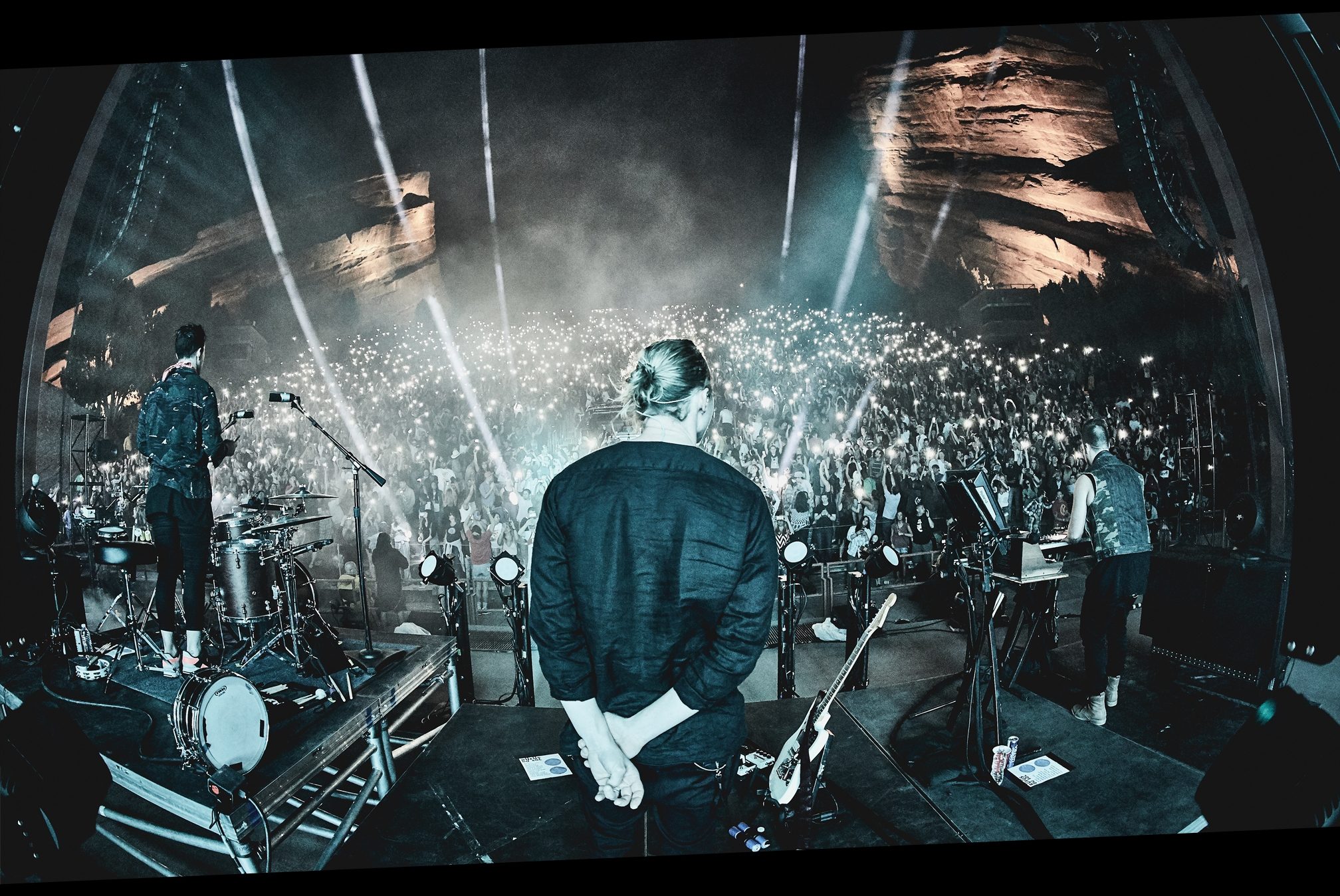
What was meant to be a brief getaway for a lyric-writing weekend in the desert, two hours due east of Los Angeles, turned into much more. “We were only supposed to do some soul-searching,” Tyrone says. Surrounded by rugged mountains and boulders that seem to have been plucked straight off the surface of Mars, it’s no surprise that the barren haven of the Joshua Tree National Park holds a special place in the hearts of many creative people who have ventured through. For Rüfüs, the stars aligned, and a final track for the album was born.
Perhaps it was conditioned – from their Mother Earth-inspired studio space (also equipped with light-up stars and a small, rotating moon lamp in one corner), or the illuminating shots of planets and the mysteries of the universe that rotate on the screensaver of their computers – but outer space is a strong theme of their latest work. “We didn’t consciously set out to do a space theme, musically,” Jon George explains. “When we start a project, we go through the alphabet from A to Z and choose a topic for track titling. The first record was locations, the second was animals, and this one was space.”
The sun has set, but the house is still teeming with friends, excitedly chattering about the upcoming record. A handful have gathered and piled onto a small sofa in the studio for a first listen to the tracks the band have been working on over the past year. Tyrone spins around in the lone studio chair like a captain on the bridge, the glow of the computer screensaver behind him (Saturn and her rings) lighting up his halo of hair. He flicks a strand out of his eyes and cracks a bright smile as he catches sight of his girlfriend, across the room. She’s almost disappeared beneath an astronaut helmet-turned-disco ball, and is breaking out into robotic dance moves as the first previews of ‘Solace’ begin. It’s time to explore the universe they’ve been crafting over the past year.
Rüfüs’ buttery synths and delicate, sparkling melodies have always managed to find the sweet spot between ease and power, packing enough warm, billowing energy to fill entire arenas but never foregoing a sense of intimacy and tenderness, too. In a few months’ time they’ll be touring enormous stages and in cavernous rooms, ready to perform. With an artillery of new gear like the piercing Prophet 6 and the nostalgia-inducing OB-6 synth, they seem to have finally unleashed something that’s been rumbling below the surface all along. One track, working title ‘Sun’ (‘Eyes’ on the final release) hits the ground running, exploding into a majestic Moog-powered bassline and bringing jarring, crinkly synths into play. Others like ‘Underwater’ and ‘No Place’ lean into the yearn of Lindqvist’s vocals before making way for shockingly bold synth twangs to slam in. ‘Interstellar’ (another working title) stands out, while the recurring soundscape of soaring, minor-toned synths takes you straight back to the sci-fi fascination of the 80s.
Flash forward to a balmy night under a skyline of towering, rustling trees somewhere in Rothbury, Michigan. Thousands of people have assembled to catch Rüfüs’ anticipated set at the annual Electric Forest. The lights cut out and it’s pitch black save for the deep blue glow of the stage. Tyrone appears first under a lone spotlight and is flanked a second later by Jon on his right and James on his left, the pair coming into view as lights from behind beam across the entirety of their crowd, which feels a million miles long. It’s almost as if things begin to move in slow-motion: a syrupy, cinematic scene plucked from a movie as Tyrone closes his eyes and takes the mic in both hands, his partners looking off into the sea of an audience in front of them and picking up their instruments.
The song hits familiar uplifting tones, but a closer listen reveals darker, heavier themes than the band have ever dialled into before. Caught between the brassy chorus bellows of ‘Underwater’ is a breathy, telling lyric that nearly fades out before managing to cry out a desperate plea:
“Help me out before I die
Save me now before I give up...”
“That song is about finality, saying goodbye, and acceptance,” explains Tyrone, a cloud passing over his normally sunny expression as he recounts spending two years in turmoil after the fallout of a tumultuous relationship, facing bouts of depression he’d never felt before while simultaneously working with the band to write new material.
The weeks Tyrone spent dealing with dark times still required him to show up at the studio, so he channelled his feelings into the lyrics of a song. “When we were writing ‘Underwater’, I felt very trapped. The lyrics that came out felt very true [and described] that feeling of desperation,” he says. He recognises that though he’d hit a block in his personal journey (though admittedly, he hasn’t been exposed to much hardship in his life so far) it’s far from the end of the road. “It will evolve,” he adds, optimistic in tone and returning to his ebullient self. “Our first records have a lot of hope. It’s easy to lean into sunshine, or feelings of gratitude. But this record is a very clear snapshot. It’s heavier than the last two, but I really love it. It’s confronting.”
Back on stage at Electric Forest, he repeats the chorus again and the crowd cheers wildly at a quiet interlude. It’s as though he’s reading a page of his own diary to several hundred of his closest friends, and it seems to be exactly the therapy he needs.
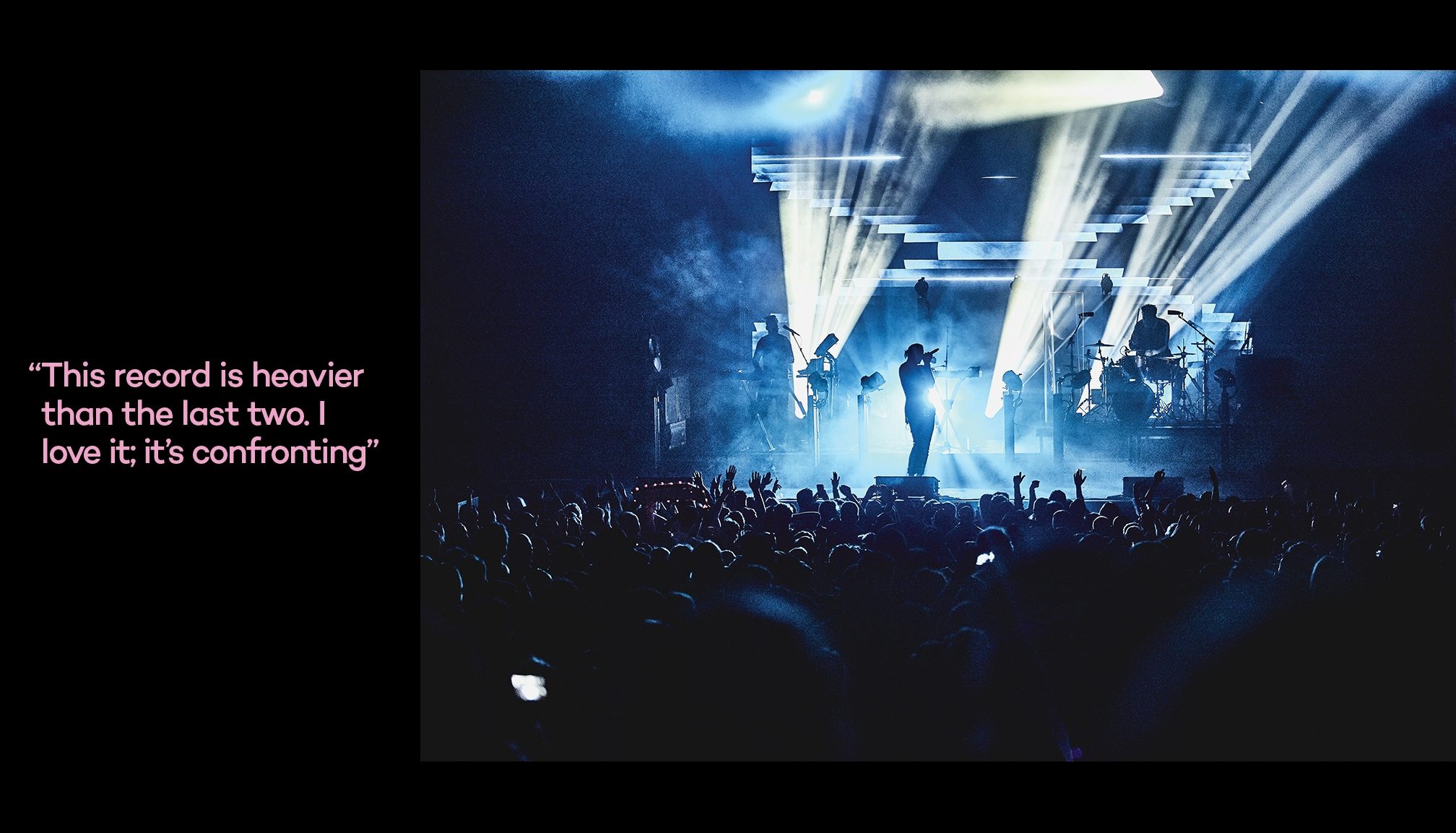
Solace, by definition, is a feeling of comfort or consolation during a time of distress. “We were searching for quite a while for the title of this record,” James says. “We started looking at words containing the word ‘sol’ as a springboard, and ‘Solace’ came up. We were starting to dive into darker themes in many ways, but at the same time, there was a lot of catharsis at home, and it melds the two.”
Recognising the interconnectedness and balance between the good and the bad is a concept as old as time. It’s dark and light, Yin and Yang, and in this iteration, it’s ‘Solace’.
“If someone can really relate to the record – the lyrical content, or the entire experience of it – if it can actually hit them to their core and if it truly connects, that’d be the ultimate,” James says, nodding at his own words. It’s one month later and the group has gathered at a studio in Los Angeles. It’s been a few weeks since they locked the doors and gave up the keys to Rose Avenue, and Jon, James and Tyrone have moved into their own spaces around the city. Today is the last studio day for the record before it’s out of their hands, off to the labels, and then given to the world.
The conversation moves along and suddenly turns to a rapid-fire ping-ponging of names of bands, DJs, and producers that they’re currently excited about; it’s easy to imagine the three as young teens, fanatic about the new music they’ve acquired, necks craning over an iPod and fighting to share an earbud to listen in. Millions have been doing the same with their music for years now, typing in “Rüfüs” into Spotify and learning each and every word of their songs.
Despite the fact that another chapter is coming to a close, the band are in high spirits. They’re reminiscing about how they first met (Jon’s younger brother Alex was Tyrone’s good friend in school), looking back on their first reactions to seeing James play drums (“He’s a weapon of a drummer!”), and of course, remembering Rose Avenue. After the record is out, and a live show is organised, Rüfüs plan to launch Rose Avenue the label, the aim to spotlight artists who work the same balancing act between electronic and live music. If they can find more acts that share their own patience and determination, and add a little bit of that shaman magic, success won’t be too hard to come by this time around.
‘Solace’ is out this autumn on Reprise Records/Rose Avenue
Listen to RÜFÜS Du Sol's Cover Mix here
Valerie Lee is Mixmag's US Digital Editor, follow her on Twitter

